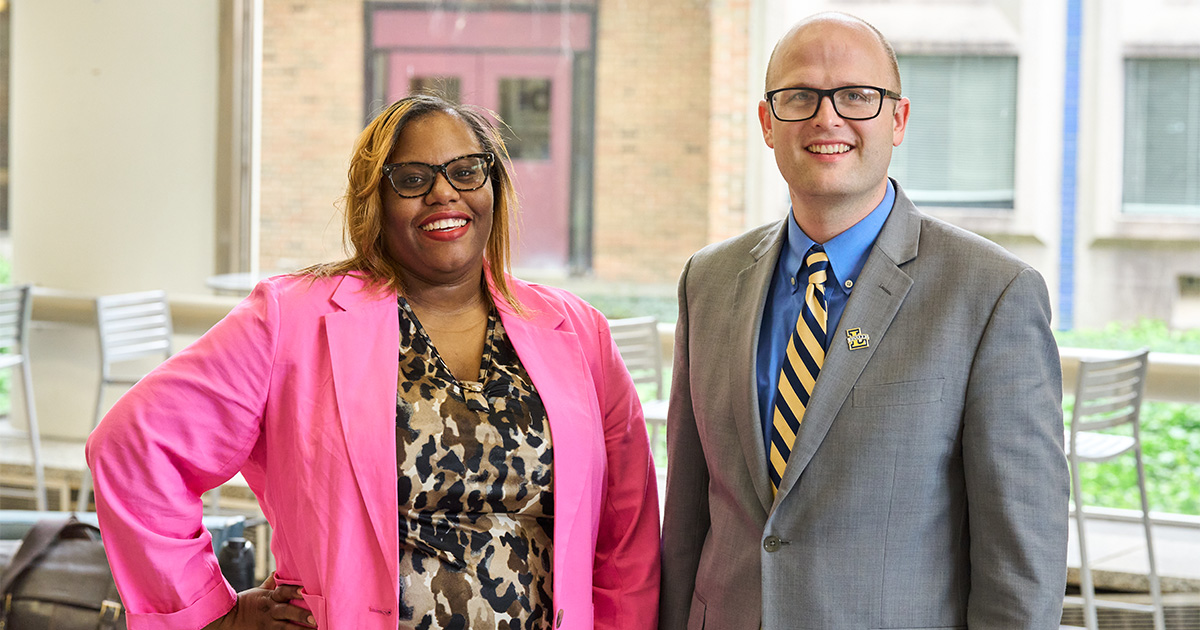La Salle University
April Lancit-Harmon, LMFT, ‘06, and Brendan Young, DSW, LSW, ‘12, returned to 20th and Olney to lead programs in their respective fields.

From left to right: April Lancit-Harmon, LMFT, ‘06, and Brendan Young, DSW, LSW, ‘12
April Lancit-Harmon, LMFT, ‘06, knew before she transferred to La Salle University as a sophomore from The Pennsylvania State University that she wanted to work in mental health.
When she completed her bachelor’s degree, she didn’t know she could pursue a master’s degree in marriage and family therapy without leaving campus.
Her studies took her to Drexel University, but her heart eventually led her back to La Salle, to lead a program she once didn’t know existed, with a mandate to better inform the next generations of potential students.
“Now, as the director, I want to be able to let people know that we’re here, we’ve been here, and if you are interested in becoming a therapist and you really want to help people, this is the program for you,” Lancit-Harmon said.
Lancit-Harmon grew up in a La Salle family not far from campus. Her mother earned a degree in social work from La Salle. Her sister will receive an MBA in spring 2025.
La Salle opened new doors for Lancit-Harmon, who knew from a young age that she wanted to help people with their mental health. She eventually zeroed in on marriage and family therapy, focused especially on Black and brown communities in Philadelphia.
She’s worked for several health systems, taught at Drexel, and was a clinical coordinator for the School District of Philadelphia. Her private practice in Bala Cynwyd celebrates its 10th anniversary this year. But when an opportunity arose in 2023 to return to her alma mater and provide the guidance that was so crucial in shaping her life, she jumped at the chance.
“La Salle has changed the trajectory of my life, my future,” she said. “Getting a chance to enroll in La Salle was an opportunity that really changed my life.”
That sense of community and connection also resonates with Brendan Young, DSW, LSW, ‘12. Unlike Lancit-Harmon, he didn’t have the option to stay at La Salle for graduate studies, the master of social work (MSW) program was not founded when he received his bachelor’s degree.
He wished as an undergrad that he could’ve stayed at La Salle for his advanced studies. Instead, his journeys to other schools informed the approach he brought in becoming an assistant professor in 2022 and the MSW program director in June 2023.
Young brings diverse experience. He has worked in hospice care, on the staff of legislators, and as a health system care coordinator. He knows how social work can be applied across a variety of paths. Whether with individuals, organizations or communities, the tenets of social work—“to engage, assess, intervene and evaluate”—are transferable.
“Having that practice-based skillset allows you when you’re in the classroom to have really meaningful conversations of connecting these theoretical ideas from the textbook,” Young said. “This is what this looks like in practice, here is the reality of that.”
Young hopes to differentiate La Salle’s MSW program in a crowded market by connecting to core La Salle values. He emphasizes a holistic view of education across departments, like business classes or education certification, and adaptability to professionals’ schedules. Several of his career steps have come via connections forged at La Salle, and he’s eager to integrate current students into that network.
“I didn’t really make connections with the faculty (at my master’s program),” Young said. “It was kind of in and out. You didn’t get the personal attention that a La Salle education provides where you have faculty that are dedicated and motivated, and where you know all of your peers that are in your program. That’s something that’s really special and unique at a program like La Salle.”
La Salle has changed the trajectory of my life, my future.
For Lancit-Harmon, work is all about community. She grew up around populations disproportionately affected by poverty and gun violence. She has served as a bridge in her career by providing resources to those with unmet needs and aspiring therapists to find mentors that look like her.
As an on-campus leader and the first African American female director of a program that has existed since 1979, she feels a sense of responsibility, but also an immense opportunity to foster inclusivity more reflective of the diversity in the campus and surrounding neighborhood.
“It is a lot of pressure, but it’s also a position of excitement because I know that there aren’t many program directors that look like me,” she said. “And I think that having representation for students to see faculty members that might look a little different than what they normally are used to is the way we open up new ideas and new relationships.”
-Matthew De George